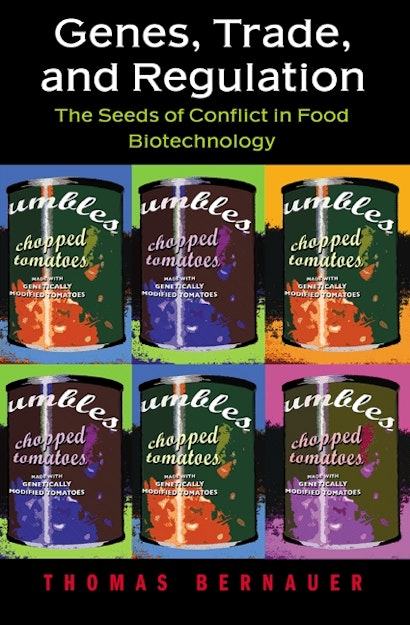Agricultural (or “green”) biotechnology is a source of growing tensions in the global trading system, particularly between the United States and the European Union. Genetically modified food faces an uncertain future. The technology behind it might revolutionize food production around the world. Or it might follow the example of nuclear energy, which declined from a symbol of socioeconomic progress to become one of the most unpopular and uneconomical innovations in history.
This book provides novel and thought-provoking insights into the fundamental policy issues involved in agricultural biotechnology. Thomas Bernauer explains global regulatory polarization and trade conflict in this area. He then evaluates cooperative and unilateral policy tools for coping with trade tensions. Arguing that the tools used thus far have been and will continue to be ineffective, he concludes that the risk of a full-blown trade conflict is high and may lead to reduced investment and the decline of the technology. Bernauer concludes with suggestions for policy reforms to halt this trajectory—recommendations that strike a sensible balance between public-safety concerns and private economic freedom—so that food biotechnology is given a fair chance to prove its environmental, health, humanitarian, and economic benefits.
This book will equip companies, farmers, regulators, NGOs, academics, students, and the interested public—including both advocates and critics of green biotechnology—with a deeper understanding of the political, economic, and societal factors shaping the future of one of the most revolutionary technologies of our times.
Awards and Recognition
- Winner of the 2005 Don K. Price Award, Science, Technology, and Environmental Politics Section of the American Political Science Association
Thomas Bernauer is Professor of Political Science at the Swiss Federal Institute of Technology (ETH) and a widely published author on international economic and environmental issues.
"[An] important and definitive book on agricultural biotechnology and the deepening trade dispute between the United States and the European Union. . . . Bernauer has done a first-rate job of exploring this contentious trade issue in an understandable way."—Dennis Pirages, Perspectives in Political Science
"Bernauer's book is the best single reference currently available treating the regulatory struggle surrounding GE (genetically engineered) foods and food crops. . . . Bernauer does not just skim the surface; with remarkable stamina and a sure analytical touch he lays the details of each issue carefully and thoroughly before readers. At a moment when polemics dominate most discussions of GE food policy, the Bernauer volume has arrived just in time."—Robert Paarlberg, Quarterly Review of Biology
"Despite working from the same body of scientific assessments, governments in Europe and North America have arrived at polar opposite conclusions about the safety of genetically engineered foods—national differences that have magnified into a global food fight. Where other studies of this problem wear blinders as they attempt to brand novel foods 'good' or 'bad,' this refreshingly clinical analysis instead trains the analytical tools of political science on the root causes of regulatory polarization. Not only does Bernauer reveal why Europe and America have arrived on opposite sides of the controversy—and why the gap is likely to yawn further—he also offers a market-based strategy for accommodating regulatory diversity in this era of globalization."—David G. Victor, author of Collapse of the Kyoto Protocol
"Policymakers, scholars, and every citizen concerned about the future of the environment, hunger, human health, and the world food supply should read this book."—Ronald Mitchell, University of Oregon
"This book provides a clear and well-developed argument that the successful development of the agricultural biotechnology sector depends on numerous decisions that have yet to be taken and would require the alignment of research and innovation strategies far more closely to consumer and regulatory requirements than has hitherto been the case."—Erik Millstone, Science Policy Research Unit, Sussex University

